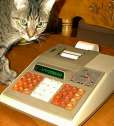Hewlett-Packard HP-12C
| Datasheet legend
Ab/c:
Fractions calculation
AC: Alternating current BaseN: Number base calculations Card: Magnetic card storage Cmem: Continuous memory Cond: Conditional execution Const: Scientific constants Cplx: Complex number arithmetic DC: Direct current Eqlib: Equation library Exp: Exponential/log functions Fin: Financial functions Grph: Graphing capability Hyp: Hyperbolic functions Ind: Indirect addressing Intg: Numerical integration Jump: Unconditional jump (GOTO) Lbl: Program labels LCD: Liquid Crystal Display LED: Light-Emitting Diode Li-ion: Li-ion rechargeable battery Lreg: Linear regression (2-var. stats) mA: Milliamperes of current Mtrx: Matrix support NiCd: Nickel-Cadmium recharg. batt. NiMH: Nickel-metal-hydrite rech. batt. Prnt: Printer RTC: Real-time clock Sdev: Standard deviation (1-var. stats) Solv: Equation solver Subr: Subroutine call capability Symb: Symbolic computing Tape: Magnetic tape storage Trig: Trigonometric functions Units: Unit conversions VAC: Volts AC VDC: Volts DC |
| ||||||||||||||||||||||||||||||||||||||||||||||||||||||||
*New version uses CR-2032 batteries
 The HP-12C is arguably one of the most successful calculators ever made. Introduced almost 20 years ago, this calculator is still in production, and it is the de facto standard shirt-pocket calculator in use by business people.
The HP-12C is arguably one of the most successful calculators ever made. Introduced almost 20 years ago, this calculator is still in production, and it is the de facto standard shirt-pocket calculator in use by business people.
The HP-12C is a programmable calculator with several business functions, including interest calculations, bonds, amortization, depreciation, and statistical functions. It has a maximum of 99 program steps or 20 data registers. When the calculator is initialized, 8 program steps are available; just like many other HP calculators, the HP-12C converts register memory dynamically into program memory as the user enters additional program steps. When all 99 program steps are used, 7 data registers still remain available for storage.
Although it isn't a scientific calculator, the HP-12C has built-in exponential and logarithm functions. This makes it easier to implement many mathematical algorithms, including that of the Gamma function. As it turns out, an implementation that calculates the function for any real argument fits neatly into the calculator's memory.
In order to run this program, registers 0-6 must be preset with the appropriate values. The program calculates the Gamma function itself (not its logarithm). The result should be accurate to at least 8 digits of precision.
M0: √2π = 2.506628275
M1: 76.18009173
M2: 86.50532033
M3: 24.01409824
M4: 1.231739572
M5: 1.208650974e-3
M6: 5.395239385e-6
01 - 1 1
02 - 34 x-y
03 - 0 0
04 - 43 34 x<=y
05 - 43,33 16 GTO 16
06 - 33 Rv
07 - 36 ENTER
08 - 33 Rv
09 - 20 ×
10 - 33 Rv
11 - 33 Rv
12 - 33 Rv
13 - 1 1
14 - 40 +
15 - 43,33 03 GTO 03
16 - 33 Rv
17 - 44 7 STO 7
18 - 34 x-y
19 - 44 8 STO 8
20 - 45 1 RCL 1
21 - 45 7 RCL 7
22 - 1 1
23 - 40 +
24 - 10 ÷
25 - 45 2 RCL 2
26 - 45 7 RCL 7
27 - 2 2
28 - 40 +
29 - 10 ÷
30 - 30 -
31 - 45 3 RCL 3
32 - 45 7 RCL 7
33 - 3 3
34 - 40 +
35 - 10 ÷
36 - 40 +
37 - 45 4 RCL 4
38 - 45 7 RCL 7
39 - 4 4
40 - 40 +
41 - 10 ÷
42 - 30 -
43 - 45 5 RCL 5
44 - 45 7 RCL 7
45 - 5 5
46 - 40 +
47 - 10 ÷
48 - 40 +
49 - 45 6 RCL 6
50 - 45 7 RCL 7
51 - 6 6
52 - 40 +
53 - 10 ÷
54 - 30 -
55 - 1 1
56 - 40 +
57 - 45 0 RCL 0
58 - 20 ×
59 - 45 7 RCL 7
60 - 10 ÷
61 - 43 23 LN
62 - 45 7 RCL 7
63 - 5 5
64 - 48 .
65 - 5 5
66 - 40 +
67 - 43 23 LN
68 - 45 7 RCL 7
69 - 48 .
70 - 5 5
71 - 40 +
72 - 20 ×
73 - 40 +
74 - 45 7 RCL 7
75 - 30 -
76 - 5 5
77 - 48 .
78 - 5 5
79 - 30 -
80 - 43 22 ex
81 - 45 8 RCL 8
82 - 10 ÷


